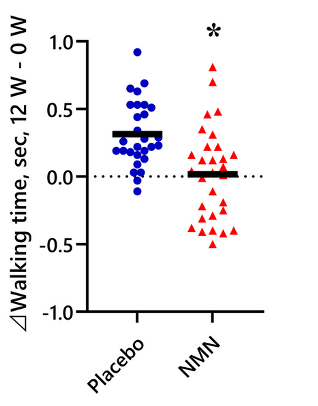NMN Prevents Physical Decline and Poor Sleep: Latest Clinical Trial
A 250 mg dose of NMN prevents a decline in walking speed and sleep quality in older adults.
Highlights:
- Twelve weeks of NMN supplementation prevents a decline in how long it takes to walk 13 feet.
- NMN also prevents a decline in sleep quality.
Our walking speed reflects the vitality of our muscles, bones, and nervous and cardiovascular systems. In this way, our walking speed can predict how long we may live. However, the quickness of our stride gradually declines after age 65, and eventually tasks of daily living become more like obstacles. As a result, our enjoyment of life can diminish dramatically.
For this reason, it is important to maintain muscle, bone, brain, and heart health with endurance and resistance exercise. Exercise may be the best preventative measure against walking slowly. Nevertheless, poor sleep and low energy levels may preclude many individuals from a consistent exercise routine. Furthermore, lack of sleep quality and fatigue may be a consequence of low NAD+ levels.
With this in mind, researchers from Japan evaluated the walking speed and sleep quality of older adults taking the NAD+-boosting compound NMN. To measure walking speed, participants were told to walk about 13 feet (4 meters) at a normal pace. After 12 weeks of taking 250 mg/day of NMN, the participants exhibited no change in walking speed. However, the placebo group exhibited a decline in walking speed.

(Morifuji et al., 2024 | GeroScience) NMN Prevents Walking Speed Decline. The time it takes to walk 4 meters increased after 12 weeks in the placebo group (blue), while there was no change in the NMN group (red).
As shown in the graph, after 12 weeks of aging, the placebo group took about 0.3 seconds longer to walk 13 feet. Since the NMN group did not display a decline in walking speed, these findings suggest that NMN can prevent walking slowly. However, no other tests of motor function measured were improved by NMN supplementation, including strength, reaction time, and the Short Physical Performance Battery (SPPB).
“The lack of observed differences between groups for the stepping test as well as the reaction time and rise and fall tests may have been because the movements of these tests are not closely related to everyday activities,” said the authors.
Sleep Quality
Sleep quality was assessed with the Pittsburgh Sleep Quality Index (PSQI), a set of questions pertaining to sleep. The PSQI is designed to assess subjective sleep quality and parameters like sleep duration, latency, and consistency. With scores ranging from 0 to 5, a higher score indicates more sleep disturbances. It was found that NMN supplementation lowered sleep scores from 3.5 to 3.2. In contrast, the placebo group’s scores increased from 3.9 to 4.3. These findings suggest that NMN can improve sleep quality in older adults.
Taking NMN to Prevent Physical Decline
While a previous study by Igarashi and colleagues showed that 250 mg of NMN taken for 12 weeks improved walking speed, another study by Kim and colleagues showed that the same regimen did not improve walking speed. In both studies, the participants were 65 years of age and older. However, in the Igarashi study, individuals who regularly exercise were excluded. Regularly exercising individuals were also excluded from the present study. Therefore, it seems that NMN may only counteract physical decline in individuals who do not routinely exercise. It follows that older adults who do not get exercise may benefit from NMN supplementation.

